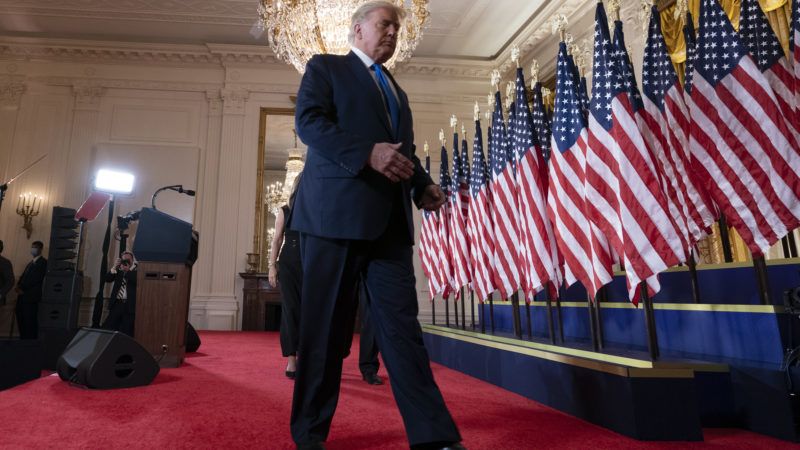Trump Says 'We'll Be Going to the Supreme Court' Over Election Results
The legal fight over mail-in ballots may soon heat up at SCOTUS.

"We'll be going to the Supreme Court," President Donald Trump declared overnight as the final results of the 2020 presidential election were still coming in. "We want all voting to stop. We don't want them to find any ballots at 4 o'clock in the morning and add them to the list."
Republicans have already been knocking on the Supreme Court's door this election cycle. On October 28, the Supreme Court denied a motion to expedite consideration of a petition filed by the Republican Party of Pennsylvania, which is fighting a Pennsylvania Supreme Court decision allowing state officials to count mailed-in ballots that are received up to three days after Election Day, so long as those ballots are postmarked by Election Day. The state court's ruling also said that ballots with no postmark or with an illegible postmark may be presumed to have been filed in a timely manner if they are received in that same three-day post-election window.
In a statement accompanying the Court's denial of the motion in Republican Party of Pennsylvania v. Boockvar, Justice Samuel Alito, joined by Justices Clarence Thomas and Neil Gorsuch, argued that the Court should have gotten involved right away. What is more, those three justices made it pretty clear that they thought the Republican Party of Pennsylvania should prevail. "It would be highly desirable to issue a ruling on the constitutionality of the State Supreme Court's decision before the election," Alito wrote. "That question has national importance, and there is a strong likelihood that the State Supreme Court decision violates the Federal Constitution."
Although SCOTUS declined to fast-track this petition, it is still pending before the Court. This means that the legal dispute could still be heard and decided by the justices. It also means that, depending on how the vote ultimately shakes out in Pennsylvania and other battleground states, this particular case could still play a role in determining the outcome of the presidential election.


Show Comments (157)